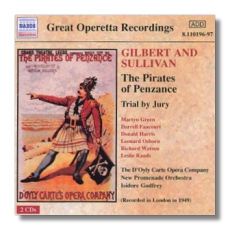
The Internet's Premier Classical Music Source
Related Links
- Latest Reviews
- More Reviews
-
By Composer
-
Collections
DVD & Blu-ray
Books
Concert Reviews
Articles/Interviews
Software
Audio
Search Amazon
Recommended Links
Site News
 CD Review
CD Review
Gilbert & Sullivan

The Pirates of Penzance / Trial by Jury
- Martyn Green (Major-General Stanley)
- Darrell Fancourt (Pirate King)
- Leonard Osborn (Frederic, Defendant)
- Muriel Harding (Mabel, Plaintiff)
- Ella Halman (Ruth)
- Richard Watson (Sergeant of Police, Learned Judge)
- Leslie Rands (Council for the Plaintiff)
- Donald Harris (Samuel Foreman of the Jury)
D'Oyly Carte Opera Company
New Promenade Orchestra/Isidore Godfrey
Naxos Historical 8.110196-97 ADD monaural 2CDs: 44:33, 69:12
The D'Oyly Carte recordings made in the late 1940s and early 1950s have not had the staying power of either their pre-World War Two predecessors or of their stereo successors. It is only the past year or so that they have been made widely available again, largely on the Pearl and Naxos Historical labels. Rehearing them, there is much to appreciate, even to heartily enjoy.
Both of these recordings date from the summer of 1949, and were initially released in all three record formats: 78, 45, and 33 rpm. Decca, the company that recorded them, was still refining its recording technologies, and sonically, there were problems with distortion, noise, and pitch continuity. David Lennick and Graham Newton have been effective at minimizing or eliminating these problems. (They seem to have used the 78-rpm discs as source material.) The sound on these CDs, while not state of the art, is eminently listenable mono.
Shortcomings first: soprano Muriel Harding was not an exciting performer, nor was she gifted with a singularly attractive voice. Her attempts to negotiate Mabel's coloratura in Pirates are brave failures. Her "sisters" in the same opera are similarly lackluster and technically unaccomplished. Halman is a dull Ruth. Godfrey's conducting is occasionally stodgy in both of the operas.
On the plus side, Godfrey takes care of the music, and even music that has become almost overly-familiar (for example, "With cat-like tread" from Pirates) can spring to new life when rapport between the podium and the singers gels. Baritone Martyn Green is a wonderfully personable Major-General. Every word in his famous Act I entry song is intelligible and delivered with wit and meaning. Leonard Osborn, a tenor who frequently sounded harsh and forced on records, acquits himself well in both operas, offering a surprisingly heroic Frederic and a Defendant who charms in spite of his irresponsibility. Darrell Fancourt's Pirate King gives a vintage performance in terms of drama, even though his vocal resources have deteriorated since his earlier recordings. Finally, bass Richard Watson creates a human and sympathetic Police Sergeant, and his Trial By Jury Judge is both comical and well sung. I wonder, however, why this role wasn't assigned to Martyn Green instead?
Naxos offers track listings, plot synopses, and brief biographies of the principal performers. Even at their budget-friendly cost, I would not recommend these versions to listeners who are looking for their first recordings of these operettas. For those who care about D'Oyly Carte history, however, they are invaluable resources, and they give a great deal of pleasure in spite of their limitations.
Copyright © 2002, Raymond Tuttle


















